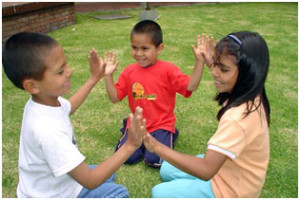 Making friends is easy, right? No – making friends can be so hard! We all want our children to have friends, be liked by others, and enjoy the company of their peers. For some children the socialization process is rather easy; for others it’s not a bit easy. What if your child is in the latter category – and it pains you to see them in psychological pain – how can you help? Should you help? What can you do to help?
Making friends is easy, right? No – making friends can be so hard! We all want our children to have friends, be liked by others, and enjoy the company of their peers. For some children the socialization process is rather easy; for others it’s not a bit easy. What if your child is in the latter category – and it pains you to see them in psychological pain – how can you help? Should you help? What can you do to help?
We are all social creatures, enjoying the company of others, needing the cooperation of others for our actual survival (only a very few can live completely alone off the grid). We crave the attention of others that cooperative society affords; we like to help others and be appreciated. Our children grow emotionally by interacting with their own age group and learn exponentially by seeing the example of others’ behavior.
When my daughter, a middle child, was in first grade she was not relating well with the other girls in her new school. She wasn’t relating badly, she just didn’t know how to make friends. I knew that having at least one special friend would make the schooling experience easier. I also realized that she really didn’t know how to make friends on her own. So I engineered a friendship that stuck and endured throughout her elementary school years. How? First I identified a classmate that I decided would be a good best friend. Then I started to send in to school an extra snack to share with the girl. Another day I sent her with 2 jump ropes. It didn’t take long for a fast friendship to form. What child doesn’t like special treatment? For that matter, what person doesn’t like special attention from another?
When that same daughter was in middle school (also a new school for her) I saw similar problems – school was OK, but not great, and she had no good friends. I didn’t do anything in 6th grade, but by 7th grade I stepped in again, by signing her up for group trip to Japan, with preparatory work (fundraising activities, culture and language lesson nights) being done throughout the year. The yearlong group activities bonded this diverse group, culminating in the overseas trip during the summer. Those friendships carried through for her 8th grade year as well. Today that daughter, now an adult, has many fast friends and knows how to make and keep them.
Joining any group is a good way to make friends for children as well as adults. Sports teams work nicely as groups to join, as well as music groups, drama productions, etc. Obviously we’re talking about common interests here. Sharing time and working on goals with like-minded others can be a nice garden for friendships to bloom.
Once a friendship is started, how is it then maintained? Attending to the friendship, really caring about the other person, getting to know them well, often placing their needs above your own is tending the friendship garden and allowing it to flourish.
And what happens when a friendship fades for one or for the other person? It happens that some friendships are good for a period of time, but then run their course and come to a recognizable end or stagnate unproductively. This occurs when one person has grown/changes and the other person either has not or has moved in a different direction. When this happens and there is no desire on the part of the other person to try to rekindle the embers of a dying fire, it’s for the best to recognize the end for what it is. Sometimes time and/or distance does this and both sides move on with their lives.
COMMUNICATION TAKEAWAY: It is easiest to have friends that are close by because proximity allows people that are paying attention to roll with the changes in the other person while in their company. Some friendships are opportunity friends (neighbors, schoolmates), without a solid base of really getting to know the person created, so those friendships easily fade when the situation changes (school ends, people move). When one side is reluctant to let go, feelings can be hurt. Most childhood friendships are of this kind, with the school setting as a teaching ground on how to make friends and get along with others outside of the family. Since friendship skills are not taught, this is largely hit or miss for children, so parental support in this area is entirely warranted.
